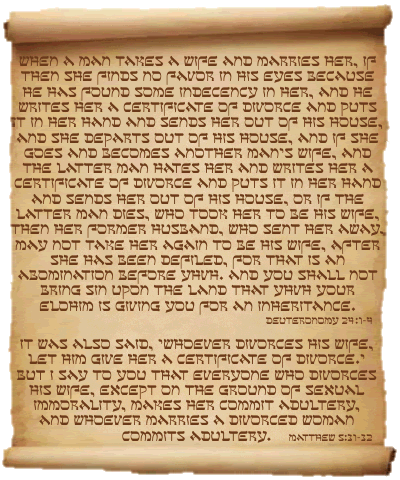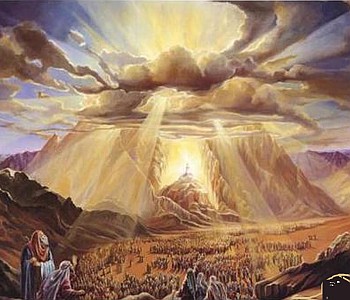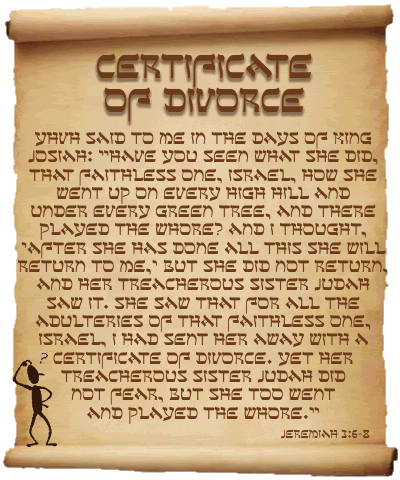
|
by haRold Smith
a citizen of the Commonwealth
(Ephesians 2:12)
The function of a Rabbi is to illuminate the reality and beauty of YHVH's ways by teaching the proper interpretation and application of the Torah. It is important to notice the context of Yeshua's beginning references within much of the passage of Matthew 5:17-48 (click on highlighted words to view content) begins with the qualification, "You have heard that it was said by them of old time…" (not "…you have read" or "it is written"). Rather than challenging what the Torah actually taught, Yeshua is refuting what they said the Torah taught. Yeshua is referring to, challenging and refuting their oral traditions which perverted the true spirit of the Torah. What Yeshua was doing in his sermon is clearly seen in His statement of Matthew 5:43-44: "You have heard that it has been said, 'You shalt love your neighbor, and hate your enemy'. But I say unto you, Love your enemies…". The Torah never taught such hatred for others, but it appears some of the Pharisical teachers had drawn such a meaning from verses as Leviticus 19:18, making a faulty inference and seriously distorting the teaching of the Law of Moses. Yeshua uses the common Rabbinic understanding that certain laws were more important than others, and that YHVH's law was certainly more important than their traditions. His application of Deuteronomy 24:1-4 in Matthew 5:31-32 above starts with the same premise. YHVH's marriage law has always been one man to one woman for life - the only exception for divorce and the allowance of marriage to another being fornication (Matthew 19:3-9). Due to the "hardness of their hearts," however, YHVH made a concession, apparently to protect the women against whom they were sinning. By the time of Yeshua, it appears that they were flippantly putting away their wives and only concerned with providing her with the "writing of divorce." Again, they missed the Nature of Spirit contained within Torah. Yeshua explained that to do thus was to, "cause her to commit adultery: and whosoever shall marry her that is divorced committs adultery, " in that she would most often marry another (Matthew 5:32).
As seen in the article Marriage and regardless of what religious traditions have been assumed into it, the only definition of marriage in scripture is having sexual relations and, as we have just seen, the only ground for divorce is sexual impropriety. Why is that? When a man and a woman engage in sexual intercourse, according to the Words of YHVH, they are married because to be "married" IS to beome "one flesh". Within that one flesh, their blood becomes intermingled which is the definition of a blood covenant. This mingling of blood creates a new union of "oneness" which is why this exchange is called a "blood covenant". It is the same bond YHVH formed with Adam in gan edan (the garden of Eden). It is the strongest bond of relationship known to humanity. The two bloods, or two lives, have been joined into one blood or one life and it is something that should never be entered into lightly. The blood covenant is the most binding covenant any two people or groups of people can enter into. Once committed to the only way out of it is by the death of one or both of the covenant makers - which is what happened to Adam and Eve when they transgressed the Words of YHVH thus forcing a separation between them and the Source of Life. YHVH told Adam in the Garden that in the day he eats of the fruit from the tree of the knowledge between what is good and what is evil - he will die. The blood covenant that had existed between YHVH and Adam dissolved that day when Adam died (Hosea 6:7).
But Adam did not physically die on that day. In fact, scripture tells us he lived for another 930 years with he and his family having interaction with the Present Presence all during that time. Since we know that YHVH is not a liar, then, in what sense did that dying occur? There are only two places in scripture where Spirit breathed upon men. The first was in the Garden where scripture tells us that the breath of YHVH became Life to Adam, the first of the Hebrews. Scripture also tells us that the Life is in the blood so when YHVH breathed Life into Adam, it became his blood. Just as my son's blood carries the DNA of his father, Adam's blood carried the DNA of his Father, YaHoVeH. Adam and YHVH were echad (Hebrew for "one"). They were in complete union, meaning the Nature they shared caused them to be as one. Adam carried the Essence of the Nature of his Father in his blood. That Essence is expressed in the Father's Glory, in His Name and in His Word. Scripture tells us that what we do, what we give ourselves to, is what we serve and what we serve is what we worship (Luke 4:8, quoting Deuteronomy 11:16, Luke 16:13). Adam's disobedience to his Father's Word injected the darkness of self-determination into that Nature, which is idolatry (worship of another god) - thus corrupting the Purity of the Blood and necessitating a separation from being echad with the Present Presence. There is a difference between adhering to the protocol that allows us to come into Presence of the Source of Life (Matthew 19:16-22) which has always been available even though externally (Exodus 33:7) and being echad, one with the shared image of the Father of Light. Immediately after the separation, we see where Adam, Eve, Cain and Able were still in His Presence and heard His Voice (Genesis 4:1-7). Being echad, however, is a very different state of being (see the Inheritance). It is the same state Yeshua prayed those who followed Him would become - just as, in like manner, in similar fashion as He is One with YHVH (John 17:20-21).

|
But Israel did not keep the Covenant. The First Commandment alone "You shall have no other gods before Me" (Exodus 20:3) is equivalent to a husband saying to his wife, "You shall have no other husband other than me" - is it not? That promise was abridged soon after the vows were made! Israel made and worshiped the molded calf, a golden calf, while Moses was up on Mount Sinai receiving the tablets. The most foundational part of any marriage contract in any culture or religion is fidelity. Idolatry is exactly the same as adultery. Throughout the history of Israel as a nation, this was the main sin with each tribe and still is. That is what caused both Judah and Israel to get themselves in major troubles over and over and brought them to face the ultimate consequence of their sin by becoming separated from the Land of Promise. First with the exile to Assyria, then to Babylon and, while there continued her harlotry (Ezekiel 23:7).

|
|
"For a married woman is bound by law to her husband while he lives but
if her husband dies
she is released from the law of marriage. Accordingly, she will be called an adulteress if she lives with another man while her husband is alive. But if her husband dies,
she is free from that law
she is released from the law of marriage and if she marries another man she is not an adulteress. Romans 7:2-3 |
Paul re-confirms this principle in his letter to the Corinthians. The only way for YHVH to bring the House of Israel back and re-marry her was to first die. But, if He is eternal, if there is no death with Him - how is He to die? Christianity solves this dilemma by saying that YHVH became Yeshua in order to accomplish this feat. However, the truth of scripture is revealed in the provision YHVH set up to address this situation legally without violating His Nature and without any mystical mumbo-jumbo. In a previous article, we explored the origin of the Hebrew word segullah, (translated as own possession in Exodus above) to mean "a valued property to which one has an exclusive right of possession". The Seal or Signet of Ownership establishes an exclusive legal right of possession to an entity that has an enforceable claim or right to something - whether created or purchased. Mere possession is not ownership. An Inheritor receives from an ancestor the right of ownership by legal succession through a will, by bequest or as a legacy. While that succession usually transpires upon the death of the principle owner, it is not a necessity. Co-ownership means that more than one person has a legal right in the same thing at the same time. Co-ownership is a legally binding status placed upon both parties who enter into an agreement (covenant) over a possession to honor the actions of the other. Thus, co-ownership can be the result of an act of bequeathment while the primary owner is still alive and the recipient agrees to his terms. In Hebrew culture, while becoming a member of the family qualifies each member to receive an inheritance, the firstborn son was usually chosen to be the Kinsman Redeemer - receiving a double portion, his father's seal (ring) and the right to be the head of the family (what is known as Primogeniture). The Father of the family pronounced which son was to become son-placed. Once this son was confirmed as the Kinsman Redeemer, he was trained and disciplined to take the responsibility accorded the head of the family.
| "For as the Father has Life in Himself, so He has granted the Son also to have Life in Himself. And He has given Him authority to execute judgment, because He is the Son of Man...for on Him (Yeshua) the Father has set His seal ." John 5:26-27, John 6:27 |
The authority Yeshua carries is as the legal recepient of the status of first-born, to be able to act in His Father's stead - as His Father. When Yeshua died, it was the same as His Father dying - thus opening the way for Spirit to remarry His Bride. He came and died for her, the House of Israel, who are called the Lost Sheep who went astray and was "swallowed up in among the Gentiles".
Part One: Marriage...
Part Two: ...Divorce...
Part Three: ...Remarriage?
Part Four: Communion
Part Five: Flesh and Blood
| "For YHVH is a merciful Elohim. He will not leave you or destroy you or forget the covenant with your fathers that He swore to them... to show the mercy promised to our fathers and to remember His holy covenant ..." Deuteronomy 4:31, Luke 1:70-72 |
Please feel free to email me at harold@hethathasanear.com. While not claiming to have all the answers, it would be an honor to partake with you of what the Spirit is uncovering.